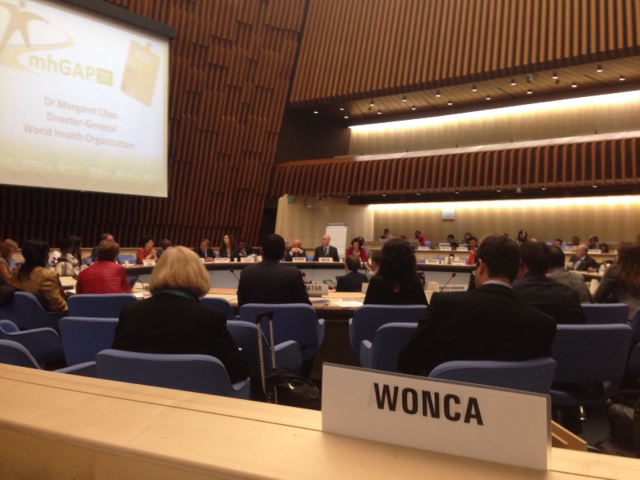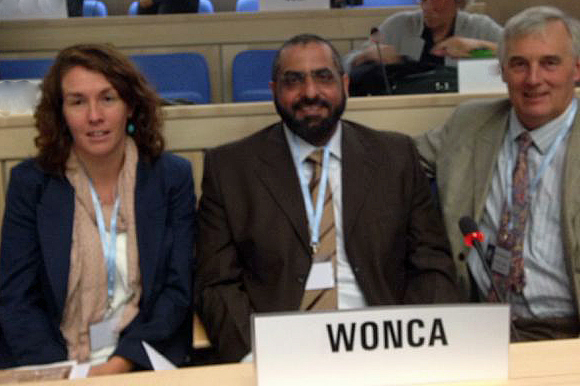Launch of the WHO's Comprehensive Mental Health Action Plan 2013-2020
 photo: Mental health Gap Action Programme forum
photo: Mental health Gap Action Programme forum
World Mental Health Day took place on 10th October. Three days prior to this during the annual
Mental Health Gap Action Programme (mhGAP) Forum which brings together the WHO Secretariat, member states and international partners, the WHO launched its
Mental Health Action Plan 2013-2020.
Mental, neurological, and substance use disorders are common in all regions of the world, affecting every community and age group across all income countries. These conditions result in 14% of the global burden of disease, however most of the people affected - 75% in many low-income countries - do not have access to the treatment they need.
The
Comprehensive Mental Health Action Plan 2013-2020 outlines four principal objectives, with associated proposed actions for stakeholders and global targets as performance indicators. The four major objects are to:
- Strengthen effective leadership and governance for mental health
- Provide comprehensive, integrated and responsive mental health and social care services in community-based setting
- Implement strategies for promotion and prevention in mental health
- Strengthen information systems, evidence and research for mental health
The launch of the Action Plan marks a significant step forward in addressing the global burden of mental health and treatment gap affecting people across all the world, in particular those from low income countries. The mhGAP Forum this year offered an opportunity for the WHO Secretariat, member states, civil society, WHO collaborating centres, other academic institution and professional associations, including WONCA, to meet and outline their commitment to the Action Plan.
WONCA has a strong history of collaboration with the WHO on Mental Health issues. The International Classification of Primary Care (ICPC), recognised by the WHO, is the classification system of choice by WONCA through which to record mental health encounters in Primary Care. In 2008 WONCA jointly published with the WHO,
Integrating Mental Health into Primary Care; A global perspective, offering examples of good practice in low, middle and high income countries and highlighting 10 common principles for the successful integration of mental health into primary care.
A Companion to Primary Care Mental Health complements this; the result of a collaborative effort between an international group of family doctors, psychiatrists, policy-makers, mental health professionals and mental health advocates. Earlier this year WONCA alongside the World Psychiatric Association and other mental health related global organisations signed the
Yerevan Declaration; a statement further confirming WONCA’s commitment to improvements in mental health. Michael Kidd’s (WONCA President) speech on the importance of integrating mental health into primary care, at the World Psychiatric Association’s conference in Yerevan can be found
here.

During the mhGAP Forum, a statement was delivered on behalf of WONCA by Luisa Pettigrew (WONCA's WHO Liaison Person), Abdullah Al-Khathami, Chris Dowrick, (pictured at left) and Gabby Ivbijaro, all from the WONCA Working Party on Mental Health. The WONCA statement is outlined. We would urge WONCA members to raise awareness of the Action Plan amongst stakeholders in their country and to consider how you also can also support the implementation of the Action Plan.
WONCA statement
"We are here today on behalf of the World Organisation of Family Doctors, otherwise known as WONCA. We represent around half a million family doctors from 130 countries and territories across the world. Primary care is a key mechanism through which to achieve universal health coverage and reduce the global burden of non-communicable diseases. Integrating mental health services into primary care can generate good quality cost-effective outcomes. It is an essential way to close the treatment gap and ensure that people have access to the care they need, close to home.
WHO and WONCA have a long history of collaboration including having jointly published ‘Integrating Mental Health into Primary Care; A global perspective’. This offers examples of good practice and highlights 10 common principles for the successful integration of mental health into primary care. We urge you to use this as a point of reference in the implementation of the Action Plan.
WONCA is committed to supporting the Action Plan’s implementation and in line with its objectives we can:
- Provide access to clinicians and academics with expertise and leadership skills to support effective governance;
- Support the development of training programmes for community based mental health workers;
- Enable the dissemination of national and international mental health policy to primary care professionals on the ground;
- Support access to networks for research and evidence into high quality primary care mental health, and continue to assist with improvements in the ability to capture information on mental health from a primary care perspective (i.e. ICPC).
It is however also important to emphasise that primary care systems must be strengthened before mental health integration can be reasonably expected to flourish. Therefore we urge member states to invest in training primary care health workers, including family doctors, nurses, psychologists and other community health workers, to work in well-resourced community clinics that allow them to deliver high quality integrated care.
We look forward to working with you all to implement the action plan. Please do not hesitate to approach us. Many thanks."